



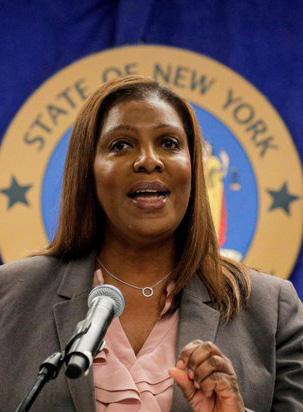


























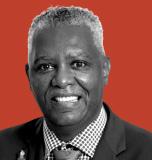
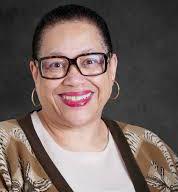


Biden-Harris Administration Commits Record $17 Billion to HBCUs by Stacy M. Brown - P 8
DOJ and State Attorneys General File Joint Consumer Lawsuit by Charlene Crowell - P 8
NYC H+H & Baby2Baby Distribute Maternal Health & Newborn Supply Kits to Mothers in New York - P 17
Stellar Caribbean Performances at Diamond League - P 19
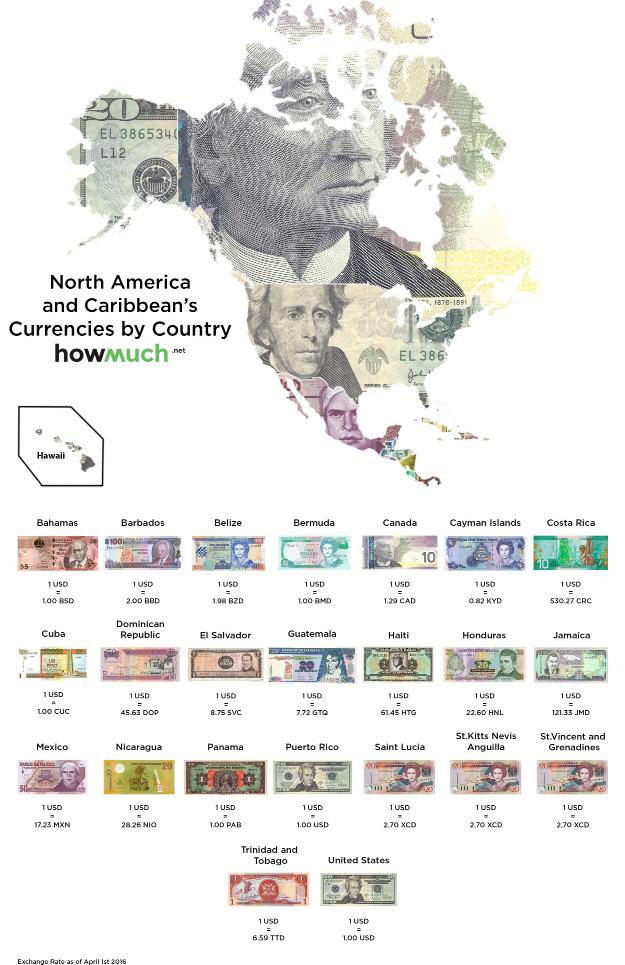
Two elected seats for small island developing states and two permanent seats for African countries would be added to the UN Security Council, according to the Biden administration’s plans.
The plan was unveiled on September 12, 2024, by U.S. Ambassador to the UN Linda Thomas-Greenfield, culminating her almost four-year endeavor to grant greater authority to nations that have traditionally been excluded from decisions about global peace and security.
As the UN General Assembly prepares to meet from September 22–24, the announcement has been made. Though it’s unclear if the reform talks would be finished in time for the general assembly, a senior administration official stated that the United States is ready to “get to work on a resolution for a vote in the general assembly to amend the U.N. Charter,” prepare amendments, and pursue “text-based negotiations.”
The official briefed reporters by phone the morning of the event, saying, “The announcement we’re making today helps to put some meat around the bones of our vision for a reformed Security Council, but there are many questions that will need to be addressed between and among member states, and that ultimately will be fodder for the text-based negotiations.”
Health teams brave war conditions in Sudan to save newborn babies
The civil war in Sudan has brought to country’s health system to its knees. UN mobile health teams are attempting to plug the gaps, crossing conflict zones to help pregnant women to give birth in safety.
Under shelling and gunfire, Esraa cradled her newborn son. As the war in Sudan broke out in April 2023, she was trying to reach a health clinic for treatment for her baby, who had been struggling with infections and breathing difficulties. But with the roads blocked by fighting, the young mother never made it to the clinic; her son died in her arms.
When she became pregnant again in August last year, she was haunted by the fear of losing another child. “There’s only one functioning maternal hospital left in Khartoum,” said Esraa. “It’s incredibly dangerous to move around the city – one of our neighbours died on her way to the hospital.”
Throughout the war, Esraa and her family have been forced to move repeatedly as areas that were safe one day became lethal the next. They eventually found refuge in a crowded shelter with other displaced people from Khartoum. Once the largest city in Sudan, Khartoum now has vast areas that resemble ghost towns. In shelters set up for people forced from their homes, conditions are dire: Overcrowding is rampant and basic hygiene essentials mostly missing. Food is also increasingly scarce, leaving many battling severe hunger as Sudan faces the worst levels of acute food insecurity ever recorded in the country.
How aid is (and is not) getting into Gaza
A relentless siege, deadly targeted attacks and chronic restrictions on lifesaving aid deliveries into the war-torn Gaza Strip by Israeli forces: that’s just some of what aid workers are grappling with as they try to provide the level of lifesaving assistance needed to stave off widespread famine and epidemics in the strip.
UN News looked at the needs triggered by the ongoing conflict through a lens of how much aid is getting into Gaza compared with what is required to address the grim situation on the ground, where 2.3 million Palestinians are trapped amid an ongoing war that began almost one year ago following Hamas-led attacks that left more than 1,000 people dead in Israel and 250 taken hostage.
Now they are grappling with rampant hunger, the spread of disease, vast destruction, a decimated healthcare system, water and sanitation infrastructure and a severe lack of basic necessities.
Here’s the latest:
Delivery cuts to Gaza
The only way into the besieged occupied Gaza Strip, surrounded by Israel to the north and east and Egypt to the south, is through Israeli-controlled borders.
UN warns of continued prohibited weapons transfers to Ukraine, Russia
Amid continuing prohibited weapons transfers to Ukraine and Russia during the ongoing war, top disarmament and legal officials issued calls on Friday for parties to the conflict to abide by international law and protect civilians.
Warning the Security Council, High Representative for Disarmament Affairs Izumi Nakamitsu said that since the last briefing on weapons transfers only two weeks ago, the provision of military assistance and transfer of arms and ammunition to the Ukrainian armed forces have continued in the context of Russia’s full-scale invasion of Ukraine in violation of the UN Charter and of international law.
“Any transfer of weapons and ammunition must be compliant with the applicable international legal framework, including of course, relevant Security Council resolutions, which in certain instances impose sanctions and restrictive measures on such transfers,” she said. Shipments reportedly included such heavy conventional weapons as tanks, armoured combat vehicles and aircraft, helicopters, large-calibre artillery and missile systems and uncrewed combat aerial vehicles alongside remotely operated munitions, small arms and light weapons and their ammunition.
She also pointed to reports of States transferring, or planning to transfer, weapons such as uncrewed aerial vehicles, ballistic missiles and ammunition to the Russian armed forces and that these weapons have been used and are likely to be used in Ukraine.

Although the majority of political enthusiasts concentrate on the most recent developments in the presidential contest, political upheaval in the Empire State can drastically change how New Yorkers conduct elections and might even affect which party will be in power in Washington in 2025.
Commencing on September 22, a section of the state Voting Rights Act mandates that specific local governments obtain “preclearance” from the state Attorney General or a designated court before making any election-related actions, including those that seem insignificant.
For example, even minor changes like moving electoral districts to a different polling place or altering the early voting hours would require formal preapproval for local governments that fall under the coverage.
The nonpartisan, legally required election
administration structure that has successfully served New York voters for many years is completely overturned by the new regulation.
Additionally, it would provide AG Letitia James unparalleled control over election procedures in some of the country’s most fiercely fought congressional districts, such as those in the Hudson Valley and on Long Island.
The New York Voting Rights Act, which was approved by both houses of the Legislature and signed by Governor Hochul in 2022, is the source of the modification.
A designated court or the AG’s approval is required by law for certain counties, cities, municipalities, villages, and school districts before they may make any changes to elections or voting.
The new regulation may have an impact on jurisdictions for a variety of reasons, such as the arrest rates of citizens in “pro-
tected classes.”
If the Board of Elections in that jurisdiction wants to relocate a polling place or purge a voter list to remove deceased people, they must first request AG clearance. Even more concerning is a clause in the statute that gives the AG the authority to add further duties to the local electoral board that need prior approval.
The preclearance procedure, according to the law’s supporters, would safeguard minority voters’ civil and voting rights in New York.
The AG is attempting to undermine the state Constitution’s provision of bipartisan control over election boards with this huge power grab.
While Albany is notorious for its poor performance in many areas, election management has traditionally been an exception.
In New York, elections are overseen by nonpartisan boards with equal representation for the two major parties.
Even in areas where one party predominates, like New York City, both parties have an interest in making sure that elections go off without a hitch. There are undoubtedly some inefficiencies in this system, and it is far from ideal. However, it is effective in maintaining voter confidence.
Most significantly, our state’s constitution mandates it. However, this constitutionally required system of nonpartisan election administration is undermined by the preclearance provisions of the state VRA.
The AG essentially has veto authority over certain of the most fundamental and uncontroversial decisions and actions of
a local board of elections under the state VRA.
And even the most seasoned election lawyer would be left scratching his head by the recently enacted process for local governments to seek the AG’s consent. Less than two months before the general election of 2024, on September 22, all of this comes into effect.
Preclearance requirements affect certain municipal governments, therefore this year they will probably have an influence, particularly on important House of Representatives contests.
Typically, the largest counties are those that are subject to the new obligation. Erie, Monroe, Onondaga, and Albany counties in upstate New York are all included. Included are New York City and the counties of Nassau, Suffolk, Rockland, and Westchester that surround it.
The outcome of the hotly contested congressional contests in these counties will probably determine who will be Speaker of the House in January 2025—Mike Johnson or Hakeem Jeffries.
These already controversial House contests are about to go into the final stages, and with them the state VRA’s preclearance requirement and James’ newfound power to micromanage local election operations. All political parties and ideologies in New York want elections to be conducted honestly, fairly, and effectively; voters are already well-served by the state’s nonpartisan election administration system.
The United States is calling for reinstating a peacekeeping UN force in Haiti.
On September 16, 2024, US Secretary of State Antony Blinken briefly visited Haiti. Blinken proposed that the UN take over and resume its peacekeeping effort in the Caribbean country while he was there. The last UN mission damaged its reputation when it came to light that troops were mistreating civilians in Haiti.
The plan calls for converting the present security mission, which is overseen by Kenya, into a full-fledged UN peacekeeping force. Police and military from several nations, including Bangladesh, Kenya, the Bahamas, Barbados, Benin, Chad, and Jamaica, will participate in this expedition.
U.S. Secretary of State Antony Blinken suggested during a recent visit that the UN may intervene to assist in stabilizing the nation, which is presently dealing
with extreme political instability and gang violence.
Blinken stated in a recent address, “The mission itself needs to be renewed and that is what we are working on right now and we also want to ensure that we have something reliable, sustainable and we will look at every option. So, a peacekeeping operation would be one such option. I think there are others.”
It has been demonstrated that the arrival of Kenyan troops in Haiti in May has reduced the impact of gang violence on the nation. But they don’t have the money to do the procedure the way they want to. The United Nations is seeking assistance to prolong the operation, which might incur annual costs of up to 600 million dollars.
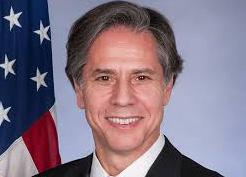
The United Kingdom’s (UK) inauguration ceremony of BritCham, Guyana, was attended by forty Guyanese enterprises on September 11, 2024. The occasion took place at London, UK’s famous Lord’s Cricket Ground in St. John’s Wood.
The event, which drew over 300 people, was described as a historic turning point for bilateral trade between Guyana and the UK in a news release released by BritCham Guyana. More than half of the new UK businesses in attendance are collaborating with BritCham to provide trips to Guyana this year.
The statement noted, “The sold-out event saw over 300 ticketed persons celebrate with BritCham Member executives and special invitees.” the statement said.
Furthermore, according to BritCham Guyana, President Irfaan Ali expressed his support for the chamber in a personal greeting issued for the occasion.
Additionally, in a video message congratu-

New York — The Consulate General of Jamaica is pleased to announce that The Most Honourable Andrew Holness, ON, PC, MP, Prime Minister of Jamaica, will be hosting a Town Hall Meeting on Saturday, September 21, 2024, at 6:00 p.m. at the Lehman Center for the Performing Arts, Bronx, New York.
This significant event will bring together members of the Jamaican Diaspora and all individuals interested in the development and future of Jamaica. Prime Minister Holness will address a range of topics of critical importance to Jamaicans at home and abroad. This gathering represents a unique opportunity for attendees to engage directly with the Prime Minister on issues affecting the diaspora and to discuss ongoing initiatives and opportunities in Jamaica.
Prime Minister Holness will be joined by the Honourable Senator Kamina Johnson Smith, Minister of Foreign Affairs and Foreign Trade, and Mrs. Alsion Wilson, O.D., Consul General of Jamaica, New
lating BritCham Guyana on its opening, UK Foreign Secretary David Lammy—a man from the diaspora himself—noted that Guyana is now the UK’s largest trading partner in the Caribbean.
Attending the historic event were representatives of the UK government, Guyanese government representatives, and well-known figures from the entertainment industry, including Guyanese, Barbara Emile, a former BBC Eastenders producer and winner of a BAFTA award, Guyanese Choice FM co-founder Yvonne Thompson, award-winning director Sally El Hosaini, Kareem “Biggs” Burke of Roc-A-fella Records, and Jadon Sancho’s Guyanese father Sean Trent Alexander.
Additionally, there were special invitees like Trevor Phillips, who supposedly gave a moving speech on his upbringing in Guyana and the character of the Guyanese people. Additionally, Faizal Khan, the founding
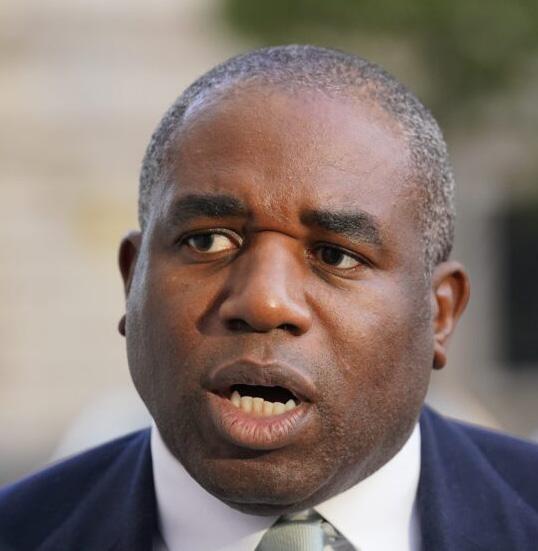
chairman of BritCham, expressed his heartfelt gratitude to all those in attendance for helping to strengthen the commercial ties between Guyana and the UK.
Khan stated, “The BritCham Guyana Lords launch event, was a tremendous success with
our data highlighting this was the biggest Guyana business event to happen in UK History. Dare I say, we do it again bigger and better next year? Watch this space and get in touch for more information www. BritChamGY.Com”
Considering this, Rachel Simmons and her band gave a live performance of a special homage to Trade Winds lead vocalist Dave Martin, who passed away recently, at the launch. Additionally, Chairman Faizal gave a particular tribute to Sir Shridath Ramphal, who was buried in Guyana.
“BritCham Guyana also soft launched their new App, which is a collaboration with BritCham member Guyana-Business .com,” The company declared.
Crucially, the app enables direct communication and group project discussions between all participants and those with tickets.
York. Together, they will provide insights into the Government’s policies and programmes aimed at strengthening ties between Jamaica and the diaspora, enhancing trade relations, and fostering investment opportunities.
The Town Hall Meeting will also have on hand members of the Consular team, where attendees can engage with them to address questions and concerns related to passports, citizenship, and other consular matters. Representatives from Jamaica Promotions Corporation (JAMPRO) will be on hand to provide guidance on investment opportunities in Jamaica, answering queries from potential investors.
Members of the public who wish to attend are encouraged to arrive early to take advantage of the services available. The evening promises to be both informative and engaging, with opportunities for entertainment that celebrate Jamaica’s rich cultural heritage.
To ensure a smooth and well-organized event, all attendees must register in advance. Registration can be completed online by visiting the Consulate General of Jamaica’s official website at www.congenjamaica-ny.org or https://lp.constantcontactpages.com/ev/reg/429tmjf.
The Government of Jamaica is committed to maintaining a strong and dynamic connection with our diaspora, recognizing their vital role in the continued development of our nation. We encourage all Jamaicans and friends of Jamaica to join us for this important event, to learn more about our shared goals and to participate in shaping Jamaica’s future.










Lawmakers in New York City recently passed legislation to examine the city’s substantial involvement in slavery and to consider reparations to enslaved individuals’ descendants.
Mayor Eric Adams, a Democrat, still needs to sign the bundle of laws approved by the City Council into law. He did not immediately reply to a message seeking comment.
Slavery was completely prohibited in New York in 1827. However, businesses—including the ancestors of some modern banks—kept making money off the slave trade until around 1866.
Democratic Council Member Farah Louis, who is the sponsor of one of the measures, informed the City Council, “The reparations movement is often misunderstood as merely a call for compensation.” She clarified that services in communities with a high concentration of Black residents are underfunded, and redlining and environmental racism are examples of how systematic forms of oppression still affect people this present day.
The measures would mandate that suggestions for redress, including reparations, to address the history of slavery be made by the city’s
Commission on Racial Equity. To establish historical facts regarding slavery in the state, it would also develop a truth and reconciliation mechanism.
A requirement of one of the ideas is that the location of New York’s first slave market be marked with a sign to be placed by the city on Wall Street in Manhattan.
The committee would collaborate with an already-existing state body that is also thinking about paying back slaves. Early in 2025, the state panel is anticipated to provide a report. It would take until 2027 for the municipal endeavor to offer suggestions.
Under former Mayor Bill de Blasio’s administration, the city’s commission was established as a result of a 2021 racial justice program.
Although reparations were intended to be a consideration at first, it resulted in the commission’s formation, which tracked living standards statistics and included a promise to address “past and continuing harms” to the first clause of the municipal charter.
“Your call and your ancestor’s call for reparations had not gone unheard,” Racial Equity
Commission executive director Linda Tigani stated during a press conference before the council decision.
The studies are estimated to cost $2.5 million based on a financial impact study of legislation. The city that is most recent to research reparations is New York. A commission of the same nature was announced this month in Tulsa, Oklahoma, the scene of a historic slaughter against Black citizens in 1921.
Reparations for Black people and their descendants were first offered by Evanston, Illinois, in 2021. Part of the payments, totaling $25,000, were distributed in 2023, as reported by PBS. The qualifying criteria were based on the harm brought about by the discriminatory housing practices or policies of the city.
The mayor of San Francisco withheld the monies after the city council decided in February that the federal government should oversee carrying out reparations. A reparations program that involved assisting Black citizens in researching their history was allocated $12 million by California, but it was defeated in the state legislature earlier this month.

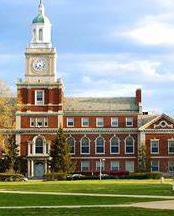
In its 2024–2025 America’s Top Colleges rankings, Forbes magazine named Howard University the top historically Black college or university (HBCU) in the country. A list of 500 institutions that annually produce graduates that are “successful, high-earning and influential from all economic backgrounds, with less student debt” is released. ROI, average student debt, and graduation results were used to rank the institutions. The journal also considered alumni wages, on-time graduation rates, and retention rates from freshmen to sophomores.
Howard University was named as the top HBCU and one of the top 100 universities in the northeast. The Forbes list also includes Spelman College, Morehouse College, Florida Agricultural and Me-
chanical University, Hampton University, North Carolina A&T State University, and other HBCUs.
The Forbes rating is released as Howard University experiences a sharp increase in enrollment and keeps expanding its innovative offerings. Bloomberg Philanthropies gave the University a record-breaking $175 million last month to fund its College of Medicine, public health programs, and the training of medical professionals of color.
The U.S. Air Force awarded the University a $90 million grant to establish the nation’s first HBCU-affiliated Department of Defense University Affiliated Research Center, which will be used to study artificial intelligence and technology systems. In fields like disease research, data science and cybersecurity, nanotechnology, business, gender studies, civil rights, disease design and validation, journalism, the humanities, and nanotechnology, the University has become a leader in thought leadership thanks to the establishment of additional research centers.
Dr. Ben Vinson III, president of Howard University, stated, “Howard University’s top ranking among HBCUs adds momentum to our march into the upper tier of the nation’s research institutions.”
He added, “Howard’s singular influence at the nexus of intellectual discovery and global culture cannot be overstated, and we will continue to push the boundaries of knowledge to help the world solve its most pressing challenges.”





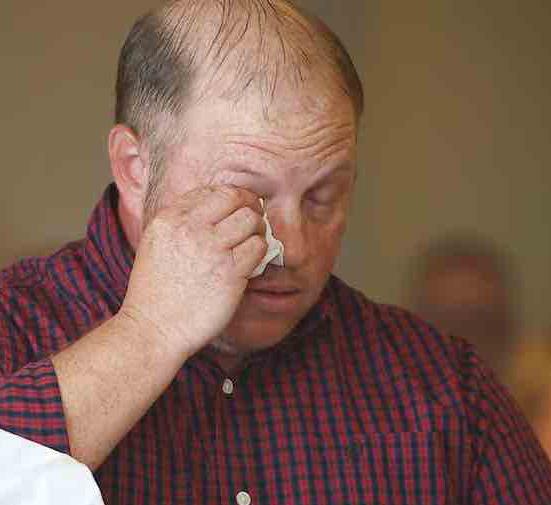
After using the murder of his 11-year-old son to disparage Haitian immigrants, an Ohio parent denounced J.D. Vance and Donald Trump as “morally bankrupt politicians.”
According to news reports, Aiden Clark’s father
criticized Vance for using his son’s death as evidence for his unfounded allegations that immigrants in Springfield were robbing and eating locals’ pets. Aiden Clark was killed in August of last year when a minivan driven by a Haitian immigrant veered left of center and collided with an approaching school bus.
Nathan Clark recently made an address during the city commission meeting’s public comment period, “I wish that my son, Aiden Clark, was killed by a 60-year-old white man.”
He added, “I bet you never thought anyone would say something so blunt, but if that guy killed my 11-year-old son, the incessant group of hate-spewing people would leave us alone.”
Clarke further remarked, “The last thing that we need is to have the worst day of our lives violently and constantly shoved in our faces, but even that’s not good enough for them.”
He then noted, “They take it one step further.
They make it seem that our wonderful Aiden appreciates your hate, that we should follow their hate.”
Springfield, a city in central Ohio with a population of over 58,000 and a metropolitan area of roughly 136,000, is home to between 12,000 and 15,000 Haitian immigrants. Clark pleaded with the Republican presidential ticket and other GOP contenders, such as Senate candidate Bernie Moreno, to refrain from using his family’s tragedy to denigrate immigrants.
“This needs to stop now. They can vomit all the hate they want about illegal immigrants, the border crisis, and even untrue claims about fluffy pets being ravaged and eaten by community members,” Clark noted.
“However, they are not allowed, nor have they ever been allowed, to mention Aiden Clark from Springfield, Ohio. I will listen to them one more time to hear their apologies.”
Having been found guilty of first-degree felony involuntary manslaughter and fourth-degree felony vehicular homicide, Hermanio Joseph— who presented an Ohio ID card and stated in court that he was in Springfield lawfully on temporary protected status—was sentenced to nine to thirteen and a half years in prison. Clark also made similar claims during the May sentencing hearing.
“This tragedy is still all over this community, the state and even the nation, but don’t spin this towards hate,” Clark noted.
He went on to say, “To live like Aiden, you need to accept everyone, choose to shine, make a difference, lead the way and be the inspiration. What many people in this community and state and nation are doing is the opposite of what we should be doing. Sure, we have our problems here in Springfield and in the U.S., but does Aiden Clark have anything to do with that?”
John Legend will not allow anyone to disparage the residents of Springfield, Ohio, where he was born and raised. The singer-songwriter is speaking out in response to ludicrous internet rumors that have gone out of control over Haitian immigrants allegedly consuming people’s pets. Former President Donald Trump and his running partner, Sen. J.D. Vance, exacerbated these rumors.
Legend refuted the accusations in a nearly six-minute Instagram video that was uploaded on Thursday, pleading with viewers to have compassion for our “Haitian brothers and sisters.”
He claims Springfield, where he was born in 1978, has been “shrinking for decades,” but under the Biden administration, more industrial employment became available, necessitating the hiring of workers. He clarifies that when Haiti descended into chaos, the federal government of the United States extended its lawful immigration program to accommodate
Haitians escaping the violence.
The city, which had 60,000 residents, has seen roughly 15,000 immigrants migrate there in recent years.
Legend stated, “You might imagine there are some challenges with integrating a new population.” He continued, “But the bottom line is these people came to Springfield because there were jobs for them, and they were willing to work. And they wanted to live the American dream.”
He then talked about the unflattering rumors.
“Nobody’s eating cats. Nobody’s eating dogs,” he stated. “We all just want to live and flourish and raise our families in a healthy and safe environment. How about we love one another?”
Legend gives an homage to his childhood name and his background at the end of the video:
“John R. Stephens from Springfield, signing off.”
Over 142,000 people have liked the post, and there have been 11,000 comments thus far.

Legend discussed the subject further when he appeared on BBC Newsnight.
Before the debate, rumors were circulating on social media regarding Haitian immigra-
tion, and postings like JD Vance, Ted Cruz, and Elon Musk only served to fan the flames. However, Trump’s now-viral statement made on the debate stage on Tuesday night was what truly highlighted the problem: “In Springfield, they’re eating the dogs, the people that came in, they’re eating the cats.”
Springfield, Ohio, authorities informed CBS News that they had not heard any reliable instances of Haitian migrants injuring pets.
Republican Gov. Mike DeWine of Ohio told CBS News in a recent interview, “This is something that came up on the internet, and the internet can be quite crazy sometimes.”
DeWine noted, “These Haitians came in here to work because there were jobs, and they filled a lot of jobs.”
DeWine added, “And if you talk to employers, they’ve done a very, very good job and they work very, very hard.”
President Joe Biden has criticized assaults during election season on the American Haitian population and called out Republican leaders for inciting fear.
During a White House brunch on September 13, 2024, that was dubbed a “celebration of Black excellence,” Biden issued a warning to Haitian Americans, saying that their group was now being targeted by attacks. His words were a critique of Republican front-runner Donald Trump and his choice for vice president, JD Vance, who have disseminated false information against Haitian immigrants and asylum seekers in the US.
“It’s simply wrong. There’s no place in America” for that type of speech, Biden stated without specifically mentioning Trump. He went on to say, “This has to stop, what he’s doing. This has to stop.”
At rallies around the US, former Republican
presidential candidate Trump and Ohio senator Mike Vance have stoked concerns of mass immigration and violence with their strongly anti-immigrant platforms.
Both men have focused their attention in recent weeks on Springfield, Ohio’s growing Haitian American population, where racial and ethnic tensions have simmered.
Springfield, which is a part of the industrial Rust Belt of the nation, has tried to attract new residents to strengthen its local economy.
However, as the population of Haitian Americans increased, the opposition also rose. An estimated 15,000 Haitian immigrants are thought to have settled in the neighborhood; however, last year, municipal commission authorities provided a lower estimate, ranging from 4,000 to 7,000.
The municipal commission was urged by some longstanding citizens to “stop them
from coming.”
When a Haitian national was engaged in an automobile accident that rolled over a school bus and killed an 11-year-old student on the first day of classes in August 2023, tensions further increased.
Although the boy’s family has urged locals to put an end to the “hate,” attacks on the Haitian American community have persisted and gained national notice.
Unfounded accusations that Haitian Americans eat dogs have been circulating the internet in recent weeks, reflecting a long-standing stereotype against immigrants in the US. Due to Trump’s recent statement “making his point” in the debate with Kamala Harris embodies this stereotype stating, “They’re eating the dogs, the people that came in…They’re eating the cats.” It has become a trend on all social media platforms to mock the former president’s
remarks, through comical skits, etc.
It seems that the story started with a screenshot purportedly acquired from a closed Facebook group. Moreover, representatives of the city have openly disputed that it had any substance. Even Vance admitted that the claims were unclear. In a September 10 social media post, he stated, “Of course, it’s possible that all of these rumors will turn out to be false.”
A Palo Alto, California counter-protester alludes to President Trump’s scare tactics of dogs being consumed in Springfield, Ohio on September 13.
However, since then, Trump and Vance have brought up the claim several times, including at prominent gatherings like the presidential debate on September 10.
by Dr. Lesly Kernisant
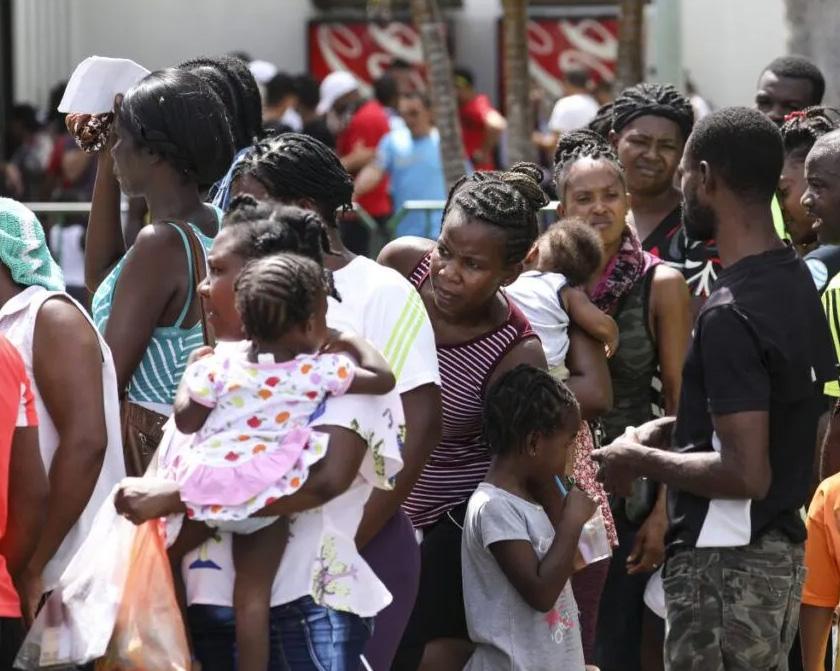
For a long time since 2016, we all have been exposed to Trump’s hateful and racist rhetoric around migrants, Over the years we have tacitly accepted the fearmongering, xenophobic incantations by politicians from the far right as a distasteful, but familiar Republican theme song. This past week, we categorically denounce the Trump/Vance strategy of targeting Haitians, a specific ethnic group with false claims of pets and animal being killed for foods by hungry Haitian migrants.
To most decent Americans, particularly blacks and browns, this is one more sickening, hateful, offensive, and factually unfounded accusation that exceeds the limit of acceptable behavior from someone seeking to represent us, a melting pot of diverse, multicultural population of the world.
It is a fact that Haiti’s internal socio-political turmoil has driven the once brave men and women of Haiti into the widening camp of desperate refugees seeking personal assistance from “unneighborly” borders, but they are far from being “animal abusers” and “pets eaters”, a designation that has long been a trope that overtly and explicitly reveals the objectionable nature of racism, xenophobia, and discrimination in the “Trump/Vance” white nationalist presidential caravan . Most of the defamatory claims against the immigrant community, including alleged illegal activities, squatting, littering, stealing and harvesting animals are lies that have been concocted for political gains. It is not only degrading but insulting to the worldwide minority community of browns and blacks who are fleeing from the ravages of geopolitical warfare and the resulting internal conflicts that drive them out of their homeland. I
suspect other international thugs, Trumplike demagogues, are spewing the same incendiary, false rhetoric about refugees seeking a better life from other minority communities of Africa, Palestine, Congo, South Sudan, and Ethiopia. Obviously, it is a double standard system where race and ethnicity determine responsible acceptance or outright rejection of the call for help like the Haitians in Ohio.
As a Haitian American myself, I am imploring all Haitian Americans everywhere in America to go to the ballot box within the next 50 days and let your grievances be heard loudly and decisively. Let Donald Trump and Vance know that you are not “cat and dog eaters”, you can instead act like “spoilers” by using your numerical power as U.S. citizens of Haitian descent with a population of 1,200,000 naturalized citizens and more than 750,000 siblings, all U,S born citizens to vote and vote in swing States like Georgia, Pennsylvania, and Florida to defeat bigots and elect true Democrats, the people’s candidates.

Donald Trump, JD Vance, and certain Republican leaders have once again turned their sights on a vulnerable community—Haitian immigrants. From inflammatory rhetoric to harmful policy proposals, their attacks on this resilient population are not just reckless; they are an affront to America’s core values. The recent wave of vitriol directed toward Haitians, many of whom hold Temporary Protected Status (TPS), has not only jeopardized lives but also tarnished the United States’ proud history of welcoming immigrants. In particular, it is important to acknowledge how Haitian immigrants have contributed to communities like Springfield, Ohio, helping to breathe new life into once-struggling areas.
The baseless targeting of Haitian immigrants is part of a broader political strategy employed by Trump and others in his camp. They are running on a platform fueled by fear, division, and chaos. Their rhetoric aims to create an enemy, a “threat” to the American way of life. In this case, the scapegoat is a group of hardworking individuals who have fled unimaginable hardship to build better lives in the United States. It is critical to recognize that Haitian immigrants, like all immigrants, have played an essential role in revitalizing communities across America. Springfield, Ohio, provides a shining example of the positive impact Haitian immigrants have had. For years, Springfield faced economic challenges, including population decline and a struggling labor force. Haitian immigrants arrived with hope and determination, working hard in various in-
dustries, from healthcare to agriculture. These new residents helped to stabilize the workforce, contribute to local businesses, and foster a sense of community and cultural exchange. Thanks to their efforts, Springfield and other cities across America are experiencing a resurgence of growth, community engagement, and diversity. Haitians in Springfield are more than immigrants—they are neighbors, co-workers, friends, and contributors to a thriving local economy.
Despite these undeniable contributions, Trump and his allies have relentlessly demonized Haitian immigrants. This is nothing new. Donald Trump has a long track record of using incendiary language to divide and scare voters. During his presidency, he notoriously referred to Haiti and other nations as “s-hole countries,” exposing his deep-seated disdain for people from non-white, non-European backgrounds. Now, as he seeks to re-enter the White House, Trump is once again relying on these dog whistles to rally his base. By attacking Haitian immigrants, Trump is not only ignoring their positive contributions but also endangering their lives. Many of these individuals are here under TPS because they fled natural disasters, political unrest, or violence in Haiti. Ending their protected status or subjecting them to heightened scrutiny would send them back into harm’s way.
Moreover, Trump’s attacks on Haitians are emblematic of a broader assault on America’s immigrant heritage. This nation was built on the contributions of immigrants from all cor-
ners of the world. From the Irish and Italians who came in the 19th century to the Haitians and other communities who have arrived more recently, immigrants have always been integral to the American story. The United States is a land of opportunity, a place where the tired, poor, and huddled masses have come seeking a better life. It is this tradition that has made America a beacon of hope for generations. The fear-mongering strategy being employed is not only immoral but also deeply irresponsible. By framing Haitian immigrants as a danger, Trump is stoking racial tensions and inciting xenophobia. This is a deliberate attempt to divide Americans along racial and ethnic lines, a tactic that has become all too familiar in the Trump era. Haitians and other immigrant groups have faced rising incidents of hate crimes and discrimination, fueled in large part by the toxic political climate created by Trump’s rhetoric. The former president is effectively putting a target on the backs of Haitian immigrants, making them more susceptible to violence and discrimination.
Yet, despite these challenges, Haitian immigrants continue to persevere. Their contributions to American society are undeniable, and their resilience is inspiring. Haitian immigrants have overcome immense adversity—whether from natural disasters like the 2010 earthquake, political instability, or economic hardship—and have come to the United States with hope and determination. They have contributed to our economy, enriched our culture, and strengthened our communities. We owe it to them, and
In 1968, Shirley Chisholm broke barriers and shattered expectations when she became the first African-American woman elected to the United States Congress. Just over fifty years later, Kamala Harris, the daughter of a Jamaican immigrant, became the first Black and South Asian woman to serve as Vice President of the United States. While the significance of these two pioneering women extends beyond their Caribbean heritage, it is this shared background that offers a powerful lens to examine their influence on American politics and their call to action for Caribbean-Americans in the United States.
Chisholm and Harris not only made history with their respective achievements but also symbolized the intersection of African-American and Caribbean-American identities. This is crucial, especially today, as the Caribbean-American community’s engagement in the democratic process becomes more essential than ever. With their votes, Caribbean-Americans can shape policies that affect not only their futures in the U.S. but also the prospects of their families and homes in the Caribbean.
The Legacy of Shirley Chisholm Shirley Chisholm was unapologetically herself: “Unbought and Unbossed,” as her campaign slogan famously declared. She was born in Brooklyn to Barbadian and Guyanese parents, and her Caribbean upbringing influenced her drive for justice, equality, and representation. Chisholm’s Caribbean roots were not incidental
to her success; they were integral. Growing up in a West Indian household where education, self-reliance, and community upliftment were emphasized, Chisholm was instilled with the values of hard work and perseverance that guided her political career.
Her accomplishments were many, from advocating for low-income and marginalized communities to breaking the mold of a male-dominated Congress. However, it was her bid for the Democratic presidential nomination in 1972 that solidified her legacy as a trailblazer for women and minorities. Chisholm knew the odds were against her, but her candidacy was more than a personal ambition—it was a statement about representation, equality, and the untapped potential of women of color in leadership roles. Though she did not win the nomination, her campaign inspired future generations of politicians, including Kamala Harris, whose historic ascent to the vice presidency echoes Chisholm’s audacity to challenge the status quo.
Kamala Harris: Building on Chisholm’s Legacy Kamala Harris’s rise to the vice presidency can be seen as a continuation of Chisholm’s legacy. Harris’s Jamaican heritage—through her father—ties her directly to the Caribbean diaspora. As Vice President, Harris has repeatedly acknowledged the groundbreaking work of Shirley Chisholm, even referencing her during her victory speech in November 2020. But Harris’s journey also reflects the evolution
to our country’s legacy as a land of opportunity, to stand up against the hate.
So, what can we do? First, we must continue to support the Haitian community in every way possible. This means offering protection to those under TPS, advocating for immigration reform that provides a path to citizenship, and standing up against anti-immigrant rhetoric wherever it rears its ugly head. Second, we must reject the politics of fear and division. Trump’s vision of America is one of chaos, conflict, and exclusion. We must organize, vote, and ensure that those who share this divisive ideology are not given the power to lead our country again. Together, we can defeat the politics of fear and restore calm and peace to the United States. As Americans, it is our duty to stand with those who seek a better life, just as our ancestors did. We must continue to be a nation that offers refuge, that values hard work and determination, and that celebrates the diversity that makes us strong. The Haitian community, along with immigrants from all over the world, embody the spirit of resilience, hope, and perseverance. And it is this spirit that will ultimately guide us toward a brighter, more inclusive future. In the end, America is not defined by fear or hatred. It is defined by its people—the millions of immigrants, descendants of immigrants, and those who still believe in the American dream. We must protect that dream for future generations, and that begins with standing up for Haitian immigrants, rejecting the politics of division, and ensuring that our country remains a place of refuge, opportunity, and hope for all.
by Basil Roman
of Caribbean-American political power in the U.S. Today, Caribbean-Americans, particularly those of African descent, are a growing demographic that cannot be ignored. Harris’s election was not just a win for the African-American and South Asian communities but also a victory for Caribbean-Americans, who saw one of their own rise to the second-highest office in the land. Her story is a reminder of the power of representation and the importance of having diverse voices in leadership.
Both Harris and Chisholm faced considerable challenges. As women of color in predominantly white male political spheres, they endured racism and sexism. Yet, they persisted, creating paths for others. Their achievements should not only be celebrated but also serve as motivation for Caribbean-Americans to become more politically active.
The Caribbean-American Vote: A Bridge Between Two Worlds Caribbean-Americans have long contributed to the social, cultural, and economic fabric of the United States. From healthcare workers to educators, entrepreneurs to civil rights activists, the community’s influence is undeniable. However, political engagement has not always mirrored this level of contribution. For many Caribbean-Americans, particularly first-generation immigrants, political involvement in the U.S. can feel secondary to the politics of their home countries. But the time has come for a shift in this mindset.
Caribbean-Americans have a unique dual responsibility: they are tied to the well-being of both their adopted home in the U.S. and their families in the Caribbean. Voting in U.S. elections is not just a civic duty; it is a powerful tool that can affect the policies that impact their lives in both places. The U.S. plays a significant role in the Caribbean, through immigration laws, trade agreements, and foreign aid.
The decisions made in Washington reverberate across the Caribbean, influencing everything from economic opportunities to climate change responses.
When Caribbean-Americans vote, they are not only shaping their futures here but also the future of their homelands. Take immigration, for example. Policies that create pathways to citizenship or temporary protected status for Caribbean immigrants directly affect families separated by borders. Likewise, the U.S. government’s stance on climate change—an existential threat to many Caribbean nations— can be influenced by elected officials who understand and prioritize these issues.
Building a Political Legacy
Shirley Chisholm and Kamala Harris have provided a roadmap for Caribbean-Americans to follow. Their successes remind us that political representation matters, that having leaders who understand your heritage and struggles can lead to meaningful change. However, their legacy is only as strong as the community that continues to build upon it.
The Biden-Harris administration’s mission to strengthen educational equity and economic opportunity was on full display again as the White House announced an additional $1.3 billion in federal investments for historically Black colleges and universities (HBCUs). The new funding brings the administration’s total investment in HBCUs to an unprecedented $17 billion since Fiscal Year 2021, setting a new record and further displaying the administration’s commitment to institutions that have long served as beacons of opportunity and excellence for Black Americans.
Though representing only 3% of all U.S. colleges and universities, HBCUs play a crucial role in fostering economic mobility. According to White House officials, HBCUs enroll twice as many Pell Grant-eligible low—and middle-income students as non-HBCU institutions, producing a significant percentage of Black professionals in critical fields—40% of engineers, 50% of teachers, 70% of doctors and dentists, and 80% of judges. Officials touted Vice President Kamala Harris, an alumna of Howard University, as an example of these institutions’ profound impact on shaping national leadership.
A White House fact sheet highlighted how HB-
CUs are not just educational powerhouses but also drivers of economic growth. Research by the United Negro College Fund (UNCF) shows that HBCUs help more than five times as many students move from the bottom 40% to the top 60% of U.S. households compared to Ivy League and other elite non-HBCU institutions. Further, a report from the Council of Economic Advisors (CEA) links HBCU enrollment with higher graduation rates and increased household incomes, affirming their role in advancing social and economic equity.
Economically, according to the UNCF, HBCUs contribute $16.5 billion annually to the U.S. economy, generate over 136,000 jobs, and produce $146 billion in lifetime earnings for their graduates. The administration’s investments aim to amplify this impact, particularly by enhancing HBCUs’ research and development (R&D) capacities in STEM fields.
The new $1.3 billion investment includes $188 million in competitive grants for R&D capacity building and $1.1 billion in funding to support students directly through need-based grants and programs like Pell Grants. According to the fact sheet, this action builds on a series of initiatives launched to expand HBCUs’ influence and capabilities, including:
Innovation in Defense: The Department of Defense created the first-ever HBCU-led University Affiliated Research Center (UARC). Howard University, leading a $90 million program over five years, focuses on advancing autonomous technologies for Air Force missions.
Bridging the Digital Divide: The Department of Commerce’s Connecting-Minority-Communities program funds 43 HBCUs to secure highspeed internet, equipment, and IT personnel, directly addressing the digital divide.
Leading in Clean Energy: The Department of Energy’s $7.75 million HBCU Clean Energy Education Prize is designed to enhance STEM education and inspire future leaders in clean energy fields.
Diversity in Agriculture: The Department of Agriculture’s $262.5 million investment supports 33 projects to train over 20,000 future food and agricultural leaders, emphasizing diversity in the agricultural sector.
Officials said that the unprecedented support for HBCUs reflects the administration’s broader agenda to promote educational excellence and equity. Reestablishing the White House Initiative on Advancing Educational Equity, Excellence, and Economic Opportunity through HBCUs further signifies this commitment, they
said. Further, according to the fact sheet, the administration’s diversity is a testament to this focus, with many HBCU graduates, including Harris, holding key roles.
The new funding coincides with Forbes magazine’s recent ranking of HBCUs. Forbes named Howard University the number one HBCU. It was ranked 273rd among the top 500 colleges and universities, ahead of Spelman, Morehouse, Florida Agricultural and Mechanical University (FAMU), North Carolina A&T, and Hampton University. The rankings showcase HBCUs’ ability to produce high-earning, influential graduates from diverse economic backgrounds, often with lower student debt.
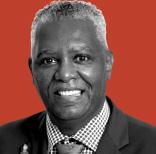
In August, the Department of Justice and eight state Attorneys Generals filed a lawsuit charging RealPage Inc., a commercial revenue management software firm providing apartment managers with illegal price fixing software data that violates antitrust law and artificially increases costs for millions of renters across the nation.
After a nearly two-year investigation, the agencies found an estimated 80 percent of renters are forced to pay falsely inflated rates while also denying honest landlords an opportunity to compete for these same customers.
The lawsuit claims RealPage’s practices are federal interstate commerce violations provided by the long-standing Sherman Act enacted in 1890.
“When the Sherman Act was passed, an anticompetitive scheme might have looked like robber barons shaking hands at a secret meeting,” stated. “Today, it looks like landlords using mathematical algorithms to align their rents. But antitrust law does not become obsolete simply because competitors find new ways to unlawfully act in concert. And Americans should not have to pay more in rent simply because a company has found a new way to scheme with landlords to break the law.” Joining the civil lawsuit are the Attorneys General of California, Colorado, Connecticut, Minnesota, North Carolina, Oregon, Tennessee, and Washington.
Falsely-inflated rental costs worsen the already disproportionate financial strain felt by people of color. Tight living spaces that come at skyhigh costs especially harm disproportionate numbers of Black and Latino renters. As Harvard’s Joint Center for Housing Studies 2024
State of the Nation’s Housing noted:
“More than half of Black (57 percent), Hispanic (54 percent), and multiracial (50 percent) renter households were cost burdened at last measure in 2022… While racial income inequality explains some of the difference, burden rates remain disproportionately high for lower-income renters of color, at 85 and 87 percent for Black and Hispanic renters, respectively, as compared to 80 percent of their white counterparts.”
The complaint alleges that RealPage contracts with competing landlords who agree to share with the firm nonpublic, competitively sensitive information about their apartment rental rates and other lease terms. This data is then used with RealPage’s algorithmic pricing software to generate recommendations, including apartment rental pricing and other terms, for participating landlords. The use of rivals’ data trove of competitively sensitive information violates interstate commerce law aimed at preventing monopolies.
The complaint further alleges that in a free market, these landlords otherwise would be competing independently to attract renters based on pricing, discounts, concessions, lease terms, and other dimensions of apartment leasing.
“Healthy competition in the rental housing market requires two key ingredients,” added Deputy Attorney General Lisa Monaco. “The market must be dictated by open and honest competition among landlords. And, renters must be able to negotiate prices with landlords — without the specter of collusion…. But RealPage has shut away those ingredients, changed the locks, and thrown away the keys. That’s
collusion — and that’s against the law.” North Carolina Attorney General Josh Stein, whose office filed the joint lawsuit on August 23 in the Middle District of North Carolina, also weighed in on the lawsuit’s importance. “Few things are as important as our homes –but too many North Carolinians struggle to afford their apartment,” said Attorney General Josh Stein. “Rents are already too high. I will not tolerate any company scheming to block healthy competition among landlords. It raises rent, and it’s illegal.”
For one North Carolina local official, the lawsuit is an opportunity to right a grievous wrong.
“Between 2010 and 2020 the median rent in Wake County jumped up 40 percent,” said Shinica Thomas, Wake County Board of Commissioners Chair. “That costs families an extra $4,200 a year. For a household that’s struggling to make ends meet, that can be the difference between stability and eviction.”
A growing metro market, Wake County is home to the state’s capitol, Raleigh. But according to multiple independent housing research reports, high rental rate increases have occurred throughout the nation, in communities of varying sizes and locales.
For example, monthly rents in Knoxville, TN reached $1,818 in February 2024, a 59.1 percent increase from 2019, according to this spring, SmartAsset.com.
More recently, Apartments.com found posted national rental rate averages by state and city. Nationally, the average national monthly cost of a one-bedroom apartment with 699 square feet is $1,563.
On a statewide basis, average rental costs in
California, the District of Columbia, Massachusetts, New Jersey and New York all surpass $2,000 for dwellings with as low as 631 square feet to no more than 727 square feet. Conversely, Oklahoma is one of the states with the lowest average rent of $880 for a 687 square foot unit.
Comparing costs and square footage by city, Apartments.com additionally found New York City had the highest monthly rental cost of $3,865, and the smallest square footage at 598 square feet. The only other city, Boston ($3,450), was the only other city with more than had over $3,000 in average rental costs. All of the following cities average rental costs exceeding $2,000 for less than 700 square feet in Los Angeles, Miami, Oakland, San Diego and Seattle.
“Access to affordable housing options is becoming increasingly difficult,” said Monica Burks, Policy Counsel at the Center for Responsible Lending. “Anti-competitive practices that inflate already high housing costs disadvantage individuals and families working hard to secure this basic need.”
Charlene Crowell is a senior fellow with the Center for Responsible Lending. She can be reached at Charlene.crowell@responsiblelending.org.

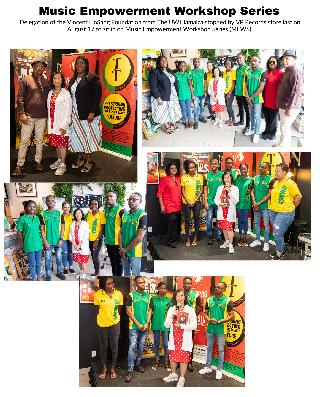



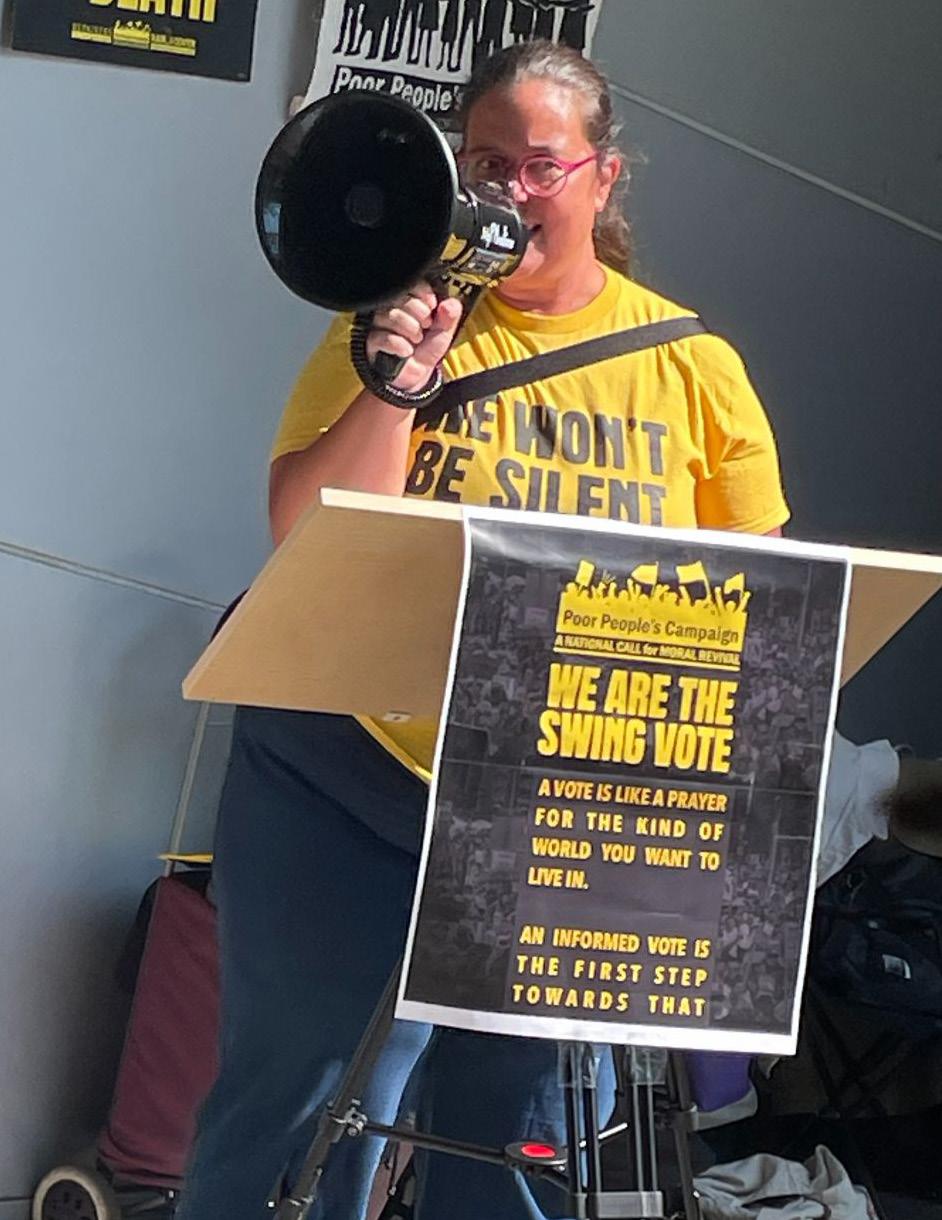
The Bronx, New York – On Saturday, September 14th, the Poor People’s Campaign held a press conference in the 44th Precinct, one of the poorest precincts in the state.
Press conferences were held simultaneously across the nation in some of the poorest precincts in the country to bring focus to the needs of poor and low-income voters. This action was part of mass mobilization actions to awaken the sleeping giant of infrequent voters in low income areas. The campaign demands that candidates seeking local and national office commit to addressing the crisis of death by poverty
and low-wealth, which kills 800 people daily, 295,000 annually.
The press conference was held on Saturday afternoon at 2:30 PM EDT, in front of the Bronx Museum of the Arts, located at 1040 Grand Concourse, Bronx, NY 10456
With approximately 85 million poor and low-income eligible voters in the US who represent at least 30% of the electorate, and around 40% in battleground states, this demographic has the power to decide election outcomes in every state.
Derrick Biney-Amissah, a NYS Poor People’s Campaign Coordinating Committee Member, introduced each speaker and worked to coordinate the event by recruiting volunteers and preparing them with the ways of the Poor People’s Campaign, which is nonpartisan and follows the principles of nonviolence.
Speakers included Jose Gonzalez, a resident of Morrisania, who spoke about the problems of insufficient wages for workers, overcrowded schools and the need to rescue hope in our communities.
Raquel Irizarry, also a Poor People’s Campaign Coordinating Committee Member, spoke of growing up in the Bronx and the importance of voting. “The idea of voting is simple. If you have ten people in a room and eight want strawberry ice cream and two want lemon ice cream, but the two lemon eaters are the only ones that vote, then everyone eats lemon.” Kat Corbell,
a Bronx resident and NYS Poor People’s Campaign member asked, “What is at stake for me in this election? Not only my health care and all health care especially for women, trans people, pregnant capable people, people in poverty, and people with chronic conditions, but threats to arrest friends and colleagues simply because we are seeking to maintain fair elections and that all voters will have their votes. What is my hope for nys and the country? My hope for New York and our country is that those elected into office will start listening to voters, and also make decisions for the best future of their voters, their constituents and not just donors or who they are invested with.”
The Reverend. Dr. Liz Theoharis, National Co-Chair of the Poor People’s Campaign and Director of the Kairos Center for Religions, Rights, and Social Justice, made closing remarks and a call to action: “In this rich country, perhaps the richest ever in human history, there are people dying from poverty, people dying from a lack of homes, people dying from a lack of healthcare, people dying from being paid low wages. But we, the 140 million poor and low-income people in this country, who make up one third of the voting electorate, have the power to make things better, not just for us, but for everybody.”
She spoke about how so many of her children’s classmates are unhoused, and how
many students had no access to the internet during the pandemic. But people have the power to change every election when they vote for candidates who say they will put more money into schools.
“We will reach out to 15 million poor and low income infrequent voters, and encourage people, make them hear us, and make those demands a reality.”
Preceding the press conference, volunteers canvassed throughout the surrounding neighborhoods, from 161st Street to 168th Street, east and west of the Grand Concourse.
Over a dozen volunteers distributed pamphlets and flyers to passersby and community members and listened to their concerns, hopes and fears. Many are excited about the upcoming election, while some remain skeptical and worried. However, the majority of those who stopped were grateful to receive more information about the voting process and information on where the candidates stand on issues that matter to them. They were also appreciative of the information and support for questions about registering to vote. Flyers included a candidates scorecard and voter information and support resources.
All photos by Shelley Valfer
International Game Technology (IGT), a global leader in gaming and operator of the Caribbean Lottery and Barbados Lottery, successfully completed its fourth annual IGT Coding and Robotics Rock! Camp for Caribbean youth this summer. Now, participating students are back to school and energized for the new year, equipped to become innovators and problem-solvers.
IGT partnered with the Mona Geoinformatics Institute (MGI) at the University of the West Indies to host the virtual camp, under the inspiring theme “Climate Action: Think It! Code It! Solve It!” The camp, an extension of IGT’s global After School Advantage (ASA) programme, consisted of introductory (Level 1) and intermediate (Level 2) programmes. A total of 72 students from five Caribbean countries - Barbados, St Kitts and Nevis, St Maarten, Jamaica, and Trinidad and Tobago - participated in the virtual camp. Included were students from the Maude Crosse Preparatory School in Nevis, The Learning Centre in Barbados and The St
Maarten Youth Council.
The Level 1 course introduced students to the fascinating world of computer science, providing a foundational understanding of coding and computing. They also explored careers in the industry, and developed essential skills such as website development and robotics. Returning students in the Level 2 programme built on the knowledge they gained last summer to explore more complex web development including HTML, CSS, and JavaScript, and an introduction to Artificial Intelligence. Students also had the exciting experience of building a robot.
As these students begin the new school year, they will remember the encouragement they received to continue their learning adventure with enthusiasm and curiosity. Guest speaker at the camp graduation, Nalini Ramsawak-Jodha, UWI Lecturer in Education (Teaching of Mathematics), congratulated the students and challenged them to continue using their knowledge to protect the environment.

A Dominican national is among two men charged with offenses stemming from the illegal trafficking and export of firearms and firearm components from the United States to the Caribbean Island.
A federal grand jury in New Haven has returned a nine-count indictment charging 29-year-old Davidson Alexander, also known as Harley, the Dominican national, residing in Suffolk, Virginia, and Neilcon St Louis, 39, of Waterbury, Connecticut, with the offenses.
The indictment was returned on Septem-
ber 5 and unsealed this week after St. Louis and Alexander were arrested.
The indictment alleges that from at least January 2021 through September 2024, St Louis, Alexander, and others, including a resident of Dominica, conspired to engage in the business of dealing firearms without a license and to export firearms, firearm components, and ammunition from the US to Dominica without authorization from the US Department of Commerce, in violation of the Export Control Reform Act.
The American-owned boarding school in Jamaica, which was closed due to accusations of child abuse, is where a Christian couple from the United States is alleged to have left their adopted Haitian son. US media outlets claim that after their 17-year-old adopted son reportedly showed signs of behavioral problems, such as running away and accessing porn, Mark and Spring Goldman of Michigan sent him to Atlantis Leadership Academy, a school for disturbed youths in St Elizabeth.
Early in 2024, the school was closed due to claims of mistreatment, including suspected beatings and waterboarding. However, according to reports, the Goldmans neglected to pick up their son, who had been left stuck in Jamaica for eight months, while other worried parents arrived to pick up their kids.
“I appreciate them for bringing me to the US, but they abandoned me,” the Detroit Free Press was informed by the youngster, who the Goldmans had adopted at the age of ten.
The Cleveland Clinic’s Dr. Carl Allamby, 53, practices emergency medicine, which is especially commendable considering that he was only 51 when he graduated from medical school.
Allamby worked for 25 years as a small company owner and automobile technician. He told a famous magazine that his career in small business started in “desperation” but ended up being quite successful.
Allamby nevertheless realized that he was looking for more satisfying employment even after developing two more sites and starting other businesses that were connected to it, such as a used vehicle firm and a towing service.
wasn’t a lot of money around, we grew up in a really poor neighborhood.”
Allamby stated, “I had always wanted to go into medicine as a child, it’s just that where I grew up, there were a lot of things that were missing for people who want to become doctors.” He added, “There just
Allamby said he had originally planned to attend college to get a business degree, but that everything changed when he enrolled in a science course after his program.
The Sunshine Awards Organization announced in New Jersey that the women’s section of the Trinidad and Tobago Police Band known for their unique and electrifying live performances is scheduled to make its highly anticipated debut in the United States with a performance at the prestigious 36th Annual SUNSHINE Awards Celebration, scheduled for Saturday, October 19, 2024, at the
Robert Treat Hotel, 50 Park Place, Newark, New Jersey 07102. This performance is regarded as a milestone as the band continues to expand its global reach. This appearance is expected to be one of the highlights of the evening. The SUNSHINE Awards Program was founded 36 years ago to recognize excellence and accomplishments in the various areas.


NYC Health + Hospitals today announced that Baby2Baby, a national nonprofit that has distributed over 450 million essential items to children living in poverty across the country, will provide Maternal Health & Newborn Supply Kits filled with critical supplies to several of their hospitals. The kits will be provided to new mothers and their babies and contain items that are vital for their health and well-being, including diapers, hygiene products, breastfeeding supplies, postpartum care items, and educational resources.
Baby2Baby Co-CEOs Norah Weinstein and Kelly Sawyer Patricof and Baby2Baby Board Member and Ambassador Kelly Rowland visited NYC Health + Hospitals/Kings County in Brooklyn to deliver Maternal Health & Newborn Supply Kits directly to new mothers alongside Dr. Wendy Wilcox, Chief Women’s Health Officer, NYC Health + Hospitals. The kits, which are part of Baby2Baby’s new initiative to combat the maternal health crisis in partnership with the U.S. Department of Health and Human Services, will also be delivered directly to mothers giving birth at NYC Health + Hospitals/Harlem, Woodhull, and North Central Bronx.
Baby2Baby has partnered with NYC Health + Hospitals to support mothers and babies since
2021, providing hundreds of thousands of essential items including diapers, wipes, hygiene products, portable cribs and car seats.
“Baby2Baby has donated hundreds of thousands of items to mothers and babies in need at NYC Health + Hospitals,” said NYC Health + Hospitals Chief Women’s Health Officer Wendy Wilcox, MD, MPH, MBA, FACOG. “These items have helped to address real, concrete needs for our patients. Our partnership with Baby2Baby has been an integral part of our solution to provide safe and equitable peripartum care to ALL. We are deeply grateful for our partnership with Baby2Baby and look forward to further collaboration with them.”
“Since 2021, Baby2Baby has been an invaluable partner to us, with unwavering support and dedication to our mission,” said NYC Health + Hospitals Chief External Affairs Officer
Deborah Brown, JD, MSW. “The visit to Kings County Hospital to deliver newborn supply kits to new mothers was a profound moment of connection and joy. These kits contain essential items for every family to have the support they need to thrive. We deeply appreciate Baby2Baby and their leadership in supporting high-quality care for all New Yorkers.”
“We couldn’t be more proud to bring Baby2Baby’s Maternal Health & Newborn Supply Kits to

New York, our second largest footprint where we serve 200,000 children every year,” said Baby2Baby Co-CEOs Norah Weinstein and Kelly Sawyer Patricof. “The goal of the program is to address the mental health struggles of new mothers who cannot afford the critical items their newborns desperately need. We are thrilled to continue our partnership with NYC Health + Hospitals and distribute the kits to moms and babies who deserve our support.”
U.S. maternal mortality rates have more than doubled in the last 20 years, disproportionately impacting Black mothers. Mental health is cited
as a leading cause of this crisis. Recognizing the urgent need for action, Baby2Baby was selected by The White House last year to pilot this program in partnership with the U.S. Department of Health and Human Services (HHS). The initiative began in three pilot states with highest maternal mortality and child poverty rates— Louisiana, Arkansas, and New Mexico. After a successful pilot and a generous multi-million dollar grant from Huggies including funds and in-kind product donations, Baby2Baby has expanded the initiative to ten states including New York, marking a significant step in the organization’s ongoing mission to provide critical supplies to mothers and babies in need.
NYC Health + Hospitals’ obstetric and gynecologic services include primary care, family planning, abortion care, prenatal through delivery care, midwifery and referrals for doula services, postpartum care, breastfeeding and lactation services, breast exams, nutrition, behavioral health referrals, preventive care, and vaccinations. Nearly 16,000 children are born at NYC Health + Hospitals each year. Gynecology services include menopause and fibroid treatments, as well as specialty practices for gynecologic cancers, pelvic pain, and endometriosis. Patients wishing to make an appointment can call 844-NYC-4NYC.
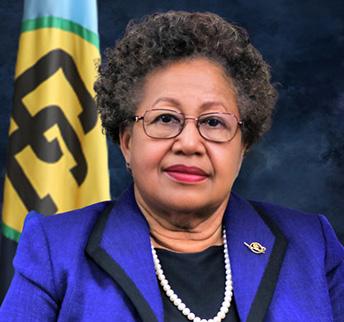
Dr. Carla Barnett, CARICOM SecretaryGeneral Caribbean Wellness Day 2024 is being observed on Saturday, 14 September, under the 2020-2024 theme, ‘Power through Collective Action’, and the 2024 sub-theme ‘Good Health is our Right!’
The observation of this day has its roots in the Port of Spain Declaration on Non-Communicable Diseases (NCDs) of 2007, which expressed the commitment of CARICOM Member States to ensure the good health and well-being of the people of the Caribbean Community (CARICOM). It promotes awareness of the impact of NCDs on the people of the Caribbean, along with measures to reduce the incidence of NCDs.
Influencing and empowering individuals to make healthier choices requires collective action and a multisectoral approach. National policies to support education on healthy food options, physical activity, and access to quality health services throughout the life course remain cornerstones to effectively address these diseases.
The Caribbean Community has been working to address NCDs, a leading cause of death in the Region, along with agencies such as the Caribbean Public Health Agency (CARPHA) and the Healthy Caribbean Coalition (HCC), an alliance of civil society to combat NCDs. The Community’s initiatives to actively support the rights of citizens to good health include the ‘Tobacco-Free Caribbean’ and ‘Caribbean Moves’ initiatives.
CARICOM Heads of Government have prioritised addressing crime and violence as a public health issue. Dr the Honourable Keith Rowley, Prime Minister of Trinidad and Tobago, who leads on Energy and Security (Drugs and Illicit Arms) in the CARICOM Quasi-Cabinet, hosted a regional symposium in April 2023. A follow-up forum is to be hosted by the Honourable Mia Amor Mottley, Prime Minister of Barbados, in November this year, as the Community continues to focus on this scourge of violence, which impacts our right to health and safety.
The Community’s efforts to increase agricultural production is intended to support good health by making more fresh food available and affordable, thereby reducing the demand for imported foods which are preserved and contain unhealthy levels of salt and fats. As we mark Caribbean Wellness Day, I urge all Member States to continue their efforts to address the Region’s health challenges through a whole-of-government and whole-of-society approach. I also encourage everyone to make those changes, such as consuming more fresh food and increasing activity levels, that will help to improve your health.
A healthy and happy Caribbean Wellness Day 2024 to all!

After four years of legal back-and-forth, musician Eddy Grant has emerged victorious in a copyright battle against former President Donald Trump over the unlicensed use of Grant’s hit song “Electric Avenue” in a 2020 campaign video. A federal judge ruled in favor of Grant, concluding that Trump and his 2020 campaign violated copyright laws by using the song without permission.
The case stemmed from a viral video posted on Trump’s Twitter account during the 2020 presidential campaign. The video featured a red “Trump-Pence” train racing ahead of a handcar operated by an animated Joe Biden, with “Electric Avenue” playing prominently throughout. Despite Grant’s cease-and-desist letter, the video remained online, amassing millions of views, which led the musician to file a lawsuit. Judge John G. Koeltl, who presided over the case, delivered a key decision: Trump’s fair use defense didn’t hold up. The campaign had argued that the video was political satire and commentary, falling under fair use. However, the court disagreed, stating that the song’s use was not transformative—it wasn’t altered or
commented on, and was used simply for its entertainment value in promoting Trump’s campaign.
The ruling emphasized that “Electric Avenue” was used in its original, unedited form, making it instantly recognizable and central to the video. Since the song wasn’t changed or used to create something new, the judge ruled that it did not qualify as fair use. Moreover, Judge Koeltl highlighted that just because a political message is involved doesn’t mean a non-political work like Grant’s song can be used without permission.
Another significant point was market harm. The judge noted that allowing such unlicensed use could undermine Grant’s ability to license the song to others in the future. The Trump campaign bypassed the well-established music licensing market, further hurting its case. The court also pointed out that the video could have easily used another song or none at all to convey its message.
As the case moves to the damages phase, this ruling sends a clear message about respecting artists’ rights, especially in politically charged
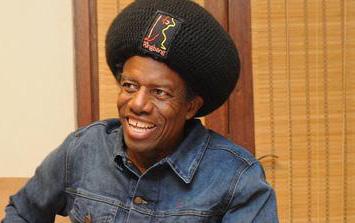
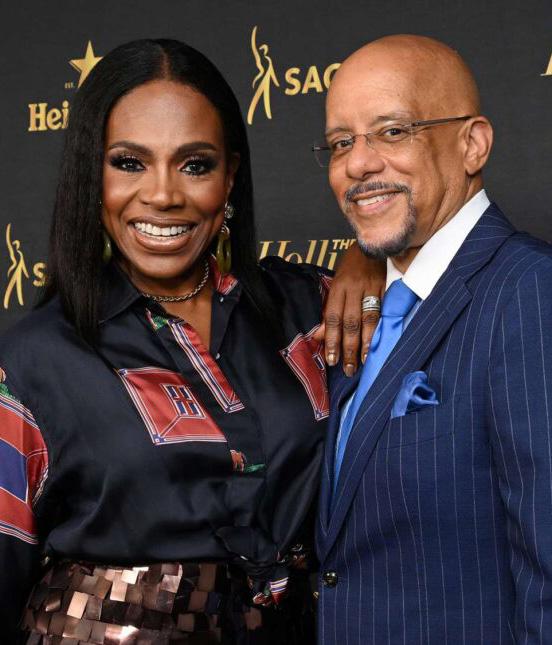
As she and her husband Vincent Hughes get closer to celebrating their 20th wedding anniversary in 2025, Sheryl Lee Ralph feels “blessed and happy”.
At the 76th Emmy Awards Performers Nominee Celebration in Los Angeles on September 13, the 67-year-old actor of Abbott Elementary talked with PEOPLE about the couple’s plans for their milestone anniversary in 2025.
Twenty years after being married in 2005, Ralph and the 67-year-old state lawmaker from Pennsylvania will commemorate the momentous milestone on July 30, 2025.
“I’m married to the senator, and I’m so blessed and happy as we get ready to celebrate 20 years next year,” Ralph noted. “Well, his state is Pennsylvania, his city is Philadelphia. Maybe [we’ll celebrate] in the courtyard of city hall or on the stairs of the Philadelphia Museum of Art. That would be wonderful,” she noted. “I don’t know, but it’ll be fabulous.”
When he asks if she plans to celebrate the anniversary in a bigger way, Ralph says, “Absolutely.” She delightfully remarked, “Why go small?” she says. “Big party.”
On September 13, 2024, Sheryl Lee Ralph is present at the 76th Emmys Performer Nominee Celebration held at the Wallis Annenberg Center for the Performing Arts in Beverly Hills.
The First African Methodist Episcopal Church in Los Angeles hosted Ralph and Hughes’ wedding in 2005. Since her spouse works in Philadelphia, the Emmy winner previously discussed how she routinely travels there to spend time with him.
“First of all, 20 years, keeping this marriage together, you have to be together sometime,” In 2022, she told the publication. “Vincent is not able to leave the state the way I can leave the state. In fact, in 20 years of our being together, I’m going to say my husband has been in California maybe 25 times. That means I’m in Philadelphia every two weeks.”
“It’s always like, ‘What are you doing there?’ ‘Um, I’m married to Sen. Hughes. I live here,’ ” Regarding the commonly asked question by fans, the Dream Girls phenomenon remarked.
Costar Lisa Ann Walter of Abbott Elementary expressed her admiration for Ralph’s family and their bond with Hughes in a July 2024 interview with PEOPLE. Walter, age sixty-one, commented. “Sheryl has a beautiful family and a beautiful support system in her entire family.” He added, “Her husband is a doll. He’s very smart, and she has a great relationship with him.”


The elements of paradise have blessed and embodied its presence in the essence of the Caribbean. The beautiful beaches, the blue skies that resemble each body of water within its territory, and the energy of the people and their music offer nothing less than an extraordinary and vibrant nature that the region encompasses. The land of wood and water is amongst the gems of the Caribbean. “What a nice place to live, sweet Jamdown”, the words of reggae sensation Tony Rebel. Among the many great accomplishments and cultural practices, the cuisine has become popular and received recognition through many publications and visitors sharing the experience their taste buds felt when delving into Jamaican cuisine.
It ranges from Jerk chicken, ackee and Saltfish, Ox Tail, Curry Goat, etc. However, the Jamaican Escovitch Fish is the highlight for today. The taste of tart that has been infused with sautéed onions, carrots, and peppers with the earthy spice that sprung from the pimento seeds is a delight. The vinaigrette taste intensifies the efforts of the scotch bonnet pepper to level up on the heat.
The sauteed vegetable is then poured onto already fried and well-seasoned Red Snapper. Even though natives tend to use other breeds of saltwater fish naturally seasoned by the Caribbean water to be fried, Red Snapper is the first choice in preparing this dish. The meat is usually purchased at the supermarket or the meat market, However, most natives and even restaurant owners make it their point of duty to meet the boats at the seaside to make their purchases from the fisherman in securing their freshly caught fish/s.
After preparing the fish to be transformed into a masterpiece (which includes scaling, removal of guts, and rinsing with diluted vinegar wash/lime juice), the use of powder season of one’s choice is used to intensify the flavors that would be captured in
This delicious dish is usually served with a side of Bammy, which is a compact grated cassava mixture that is molded to take the form of a disc. It is usually soaked in coconut milk with a pinch of salt and then fried until golden brown. This dish can be modified to accommodate any eating practices or preferences as it relates to your liking when consuming food.
Ingredients
2 pounds (900g) whole red snappers, cleaned and scaled (about 2-3 fish— almost any white fish will work)
salt and pepper to taste (or any powder/ grounded seasoning of choice)
1 lime or lemon/ 1/2 cup of distilled vinegar in two cups of water
1 medium carrot, julienned
½ red bell pepper, thinly sliced
½ yellow bell pepper, thinly sliced
2 sprigs thyme
1 Scotch bonnet pepper, pierced (to be placed in hot oil)
1 Scotch bonnet pepper sliced
¾ cup (180ml) of white vinegar (can sub red wine vinegar/malt vinegar)
freshly ground black pepper
1 teaspoon of Pimento berries
the final product.
Even the oil that is seasoned in the process of frying the fish. At 350 F crushed garlic, pimento berries, and scotch bonnet pepper are placed in the hot oil.
Process of Making Escovitch Fish
Prepare Red Snapper- Remove scales and guts. Rinse fish in diluted vinegar wash/ lime juice wash. Pat dried with a clean napkin.
Season Red Snapper- Apply dry rub with any powdered/grounded season mixture (season salt, black pepper, onion powder, etc.) onto the Red Snapper. *Marinate by choice.
Frying- Heat oil to at least 350 F before placing crushed garlic, pimento berries, and scotch bonnet pepper into the oil to be infused. Discard garlic cloves, pimento berries, etc. from oil after 3-4 minutes of being placed in the oil. Place fish into the pot to be fried for 5-7 minutes. Place fried fish on a clean napkin to absorb excess oil. *Please flip the fish onto the opposite side in the interim time of 5-7 minutes.
Preparation of Vegetables- Remove onion flakes and wash and peel/scrape carrots externally. Wash pimento berries and scotch bonnet pepper along with other vegetables being incorporated in this dish. Cut vegetables in bite-sized portions (carrots in strips and onions in rings, etc.).
Sauteed Vegetables- After heating the pot apply white vinegar and pimento berries. Then apply vegetables to stir-fry.
Apply Sauteed Vegetables to Fried Red Snapper- Place fish in a container, then apply sauteed vegetables. Cover the container with an aluminum sheet to aid in the infusion of the ceviche (vinaigrette mixture) into the fish.
½ cup (120ml) vegetable oil (more as needed)
2 cloves of crushed garlic
1 medium yellow onion, thinly sliced in rings
We hope you try this mouthwatering recipe of Jamaican Escovitch Fish, a delectable taste of the Caribbean indeed. Please share your comments below and let us know the experience your tastebud had on this trip and the various additions you have made to add your spin to t







MIAMI – The 2024 Concacaf Caribbean Cup resumes following the September FIFA international break, with eight teams looking to earn points in their hopes of lifting this year’s trophy. Two matches will highlight Tuesday’s action as AC Port of Spain hosts Grenades FC and Cavalier FC faces Real Hope FA. Moca FC and Ouanaminthe FC will clash on Wednesday and Miscellaneous Police FC versus Arnett Gardens FC will conclude the matchweek on Thursday.
The four upcoming matches will all feature first-time encounters in the Caribbean Cup.
AC Port of Spain vs. Grenades FC
AC Port of Spain will pursue its first victory of the campaign when it hosts Grenades FC in Group B on Tuesday at Hasely Crawford Stadium in Port of Spain, Trinidad and Tobago. Playing its first home match in the 2024 edition, AC Port of Spain will look to overturn
two losses in its opening encounters. John-Paul Rochford leads the team in scoring with a brace in the previous match against Moca. Grenades FC started its season with a 2-1 loss at Cibao FC. The Antigua and Barbuda side will look to regain the tournament form that led it to a runners-up finish in the 2024 CFU Club Shield. Sherman Augustin found the back of the net for Grenades in the team’s first outing.
Cavalier FC vs. Real Hope FA
Cavalier FC seeks to maintain its first place standing in Group A when it faces Real Hope FA on Tuesday at the National Stadium in Kingston, Jamaica.
The only side to start 2-0-0 in the current edition, Cavalier FC has its sights on becoming the first side to secure a spot in the semifinals. They can inch closer to qualification with a third consecutive victory. Shaquille Stein leads the team with three goals in the current campaign.
Moca FC vs. Ouanaminthe FC Moca FC looks to extend its lead atop Group B in Ouanaminthe FC on Wednesday at Estadio Moca 85 in Moca, Dominican Republic.
Alan Aciar, Gustavo Ascona, and Clifford
Thomas led Moca to a 3-2 comeback victory at home against AC Port of Spain. Goalkeeper and captain Miguel Báez has also been a factor for Moca with seven saves and one clean sheet through the opening two matches, which includes a nil-nil draw at Cibao FC. Ouanaminthe FC returns to Moca, where it hosted the 1-1 draw against Port of Spain to open its campaign. Joseph Willinx struck the tying goal to rescue a point in the club’s opening encounter.
Miscellaneous Police FC vs. Arnett Gardens FC
Miscellaneous Police FC will play for its first win in Group A when it welcomes Arnett Gardens FC on Thursday at Hasely Crawford Stadium in Port of Spain, Trinidad and Tobago. After two away defeats to start the tournament, Police FC hopes to translate a home field advantage into a victory. Kwesi Allen and Kevon Woodley lead the team with a goal apiece. After winning the 2024 CFU Club Shield, Arnett Gardens lost its opening encounter against fellow Jamaican side Mount Pleasant FA. Shai Smith leads the team’s goal after striking once in the club’s tournament debut.

BRUSSELS, Belgium – Anderson Peters of Grenada and Puerto Rico’s Jasmine Camacho-Quinn brought the curtain down at the Diamond League final here Saturday with excellent performances in their respective events
Anderson Peters won the men’s javelin at the Diamond League final Peters’ opening throw of 87.87 metres proved just enough to win the men’s javelin, with Neeraj Chopra of India a close second with his effort measured at 87.86 metres. Germany’s Julian Weber (85.97m) finished third.
Meanwhile, Camacho-Quinn, fresh from capturing bronze at the Paris Olympics, blazed to victory in the women’s 100-metre hurdles in a time of 12.38 seconds,
ahead of Nadine Fisherman of the Netherlands (12.54) and Ackera Nugent of Jamaica, who was third in 12.55 seconds. Another Jamaican, Danielle Williams was fifth in 12.62 seconds.
They were also podium finishes for Jamaica’s Shiann Salmon and Rajindra Campbell, as well as Alexander Ogando of the Dominican Republic on Saturday’s final day.
Salmon clocked 53.99 seconds to finish third in the women’s 400-metre hurdles behind Femke Bol (52.45), who secured a third consecutive Diamond League title, with Anna Cockrell of the USA second in 53.71.
Campbell placed third in the men’s shot put with his throw of 21.95 metres. The event was won by Italy’s Leonardo Fabbri, who threw a meet record of 22.98, with American Ryan Crouser second (22.79). Ogando also grabbed bronze in the men’s 200 metres in 19.97 seconds, behind eventual winner Kenneth Bednarek of the USA (19.67), who beat out Olympic gold medalist Botswana’s Letsile Tebogo (19.80) into second.
In other results, Jamaicans Roshawn Clarke (49.08) and Malik James-King (49.37) were fifth and sixth respectively in the men’s 400 meter hurdles, while compatriot Romaine Beckford settled for fourth in the men’s high jump with his effort measured at 2.22 metres.







